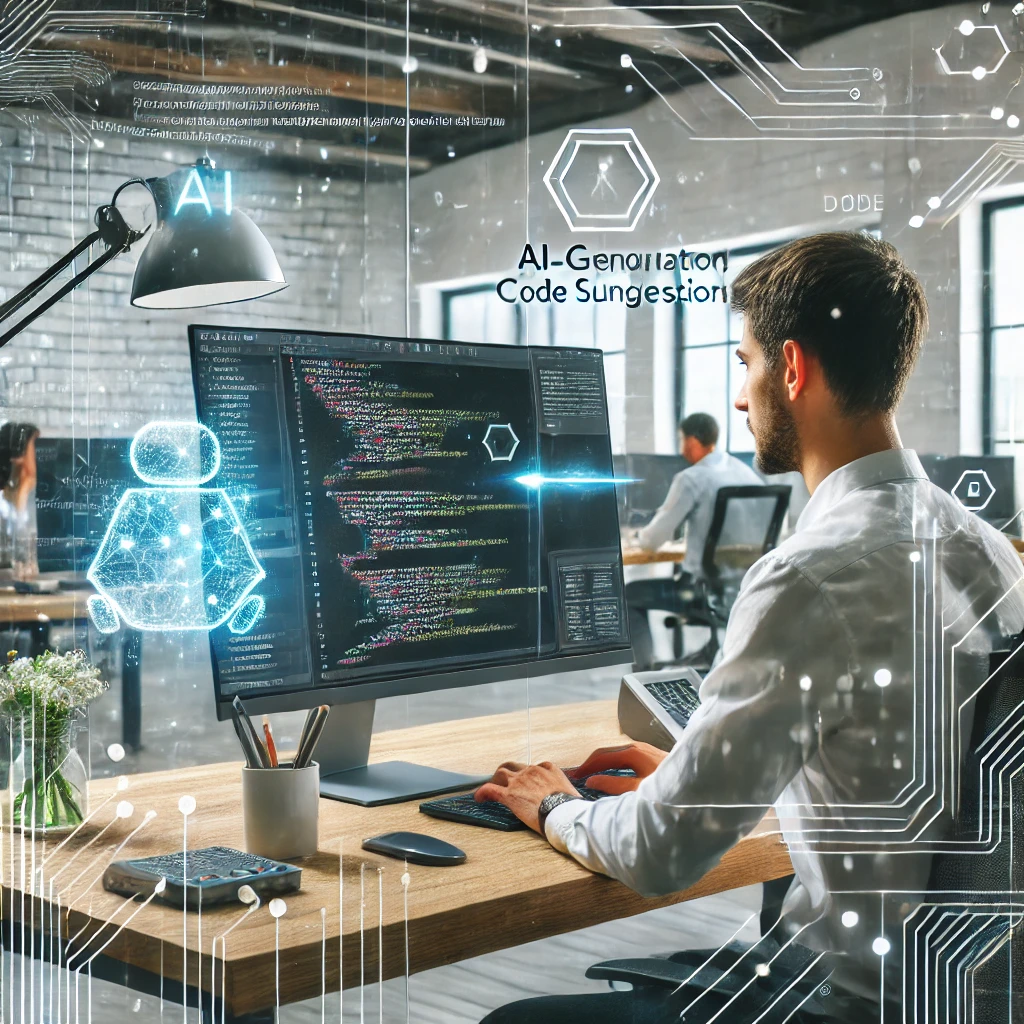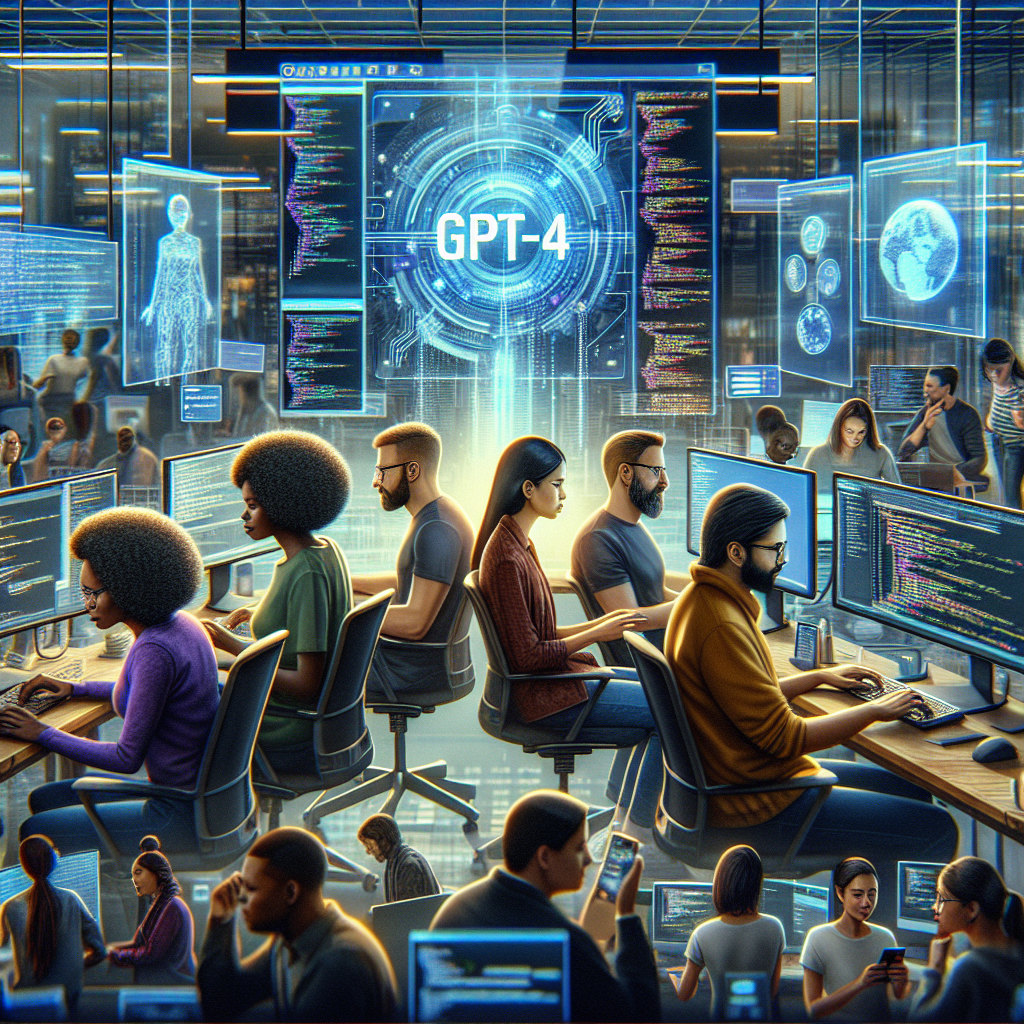Harnessing AI Tools in Software Engineering

As software development continues to evolve, companies are increasingly turning to AI-powered tools to boost productivity and address workforce challenges. At the heart of this transformation is the integration of AI-based code-completion tools, which have the potential to significantly enhance the efficiency of software engineers. These tools enable engineers to write natural language code descriptions, while AI suggests multiple code variants. By choosing and refining these suggestions, engineers can save time and focus on more complex problem-solving.
Research shows that such AI tools can accelerate code generation by up to 50%, improve debugging, and elevate product quality. However, while AI can assist engineers in writing better code faster, it cannot replace the expertise of skilled professionals. In fact, more experienced engineers appear to reap the greatest productivity benefits, while less-experienced engineers may struggle to integrate AI suggestions effectively, leading to mixed results.
This post explores how the introduction of AI tools impacts various facets of software engineering—recruitment, training, workforce motivation, and collaboration—and how companies can adapt to this new era of human-machine collaboration.
The Changing Landscape of Recruitment
The introduction of AI tools is reshaping the recruitment process for software engineers. Traditionally, companies have focused heavily on coding proficiency, but the adoption of AI assistance in coding shifts the hiring criteria towards a new set of skills.
While coding expertise will remain essential, companies will now seek candidates who are adept at leveraging AI to improve productivity and deliver high-quality code. This requires a shift in focus towards problem-solving, critical thinking, and the ability to refine AI-generated suggestions. Candidates who can collaborate effectively with AI will become highly sought after, as companies look for individuals capable of maximizing the benefits of these tools.
Key skills for AI-assisted engineering roles:
- Proficiency in using AI-based development tools
- Ability to critically assess AI-generated code
- Knowledge of cybersecurity and quality assurance to prevent AI-driven vulnerabilities
- A collaborative mindset, working alongside AI rather than relying on it entirely
Training Programs for a Hybrid Workforce
For companies to successfully implement AI tools, they must provide tailored training programs that cater to both new and experienced engineers.
- New Engineers: Training for newcomers should focus on helping them understand the strengths and limitations of AI tools. This involves teaching them how to generate and evaluate AI-driven code suggestions while maintaining a critical eye to catch potential flaws or bugs.
- Experienced Engineers: More senior engineers should receive advanced training that enables them to fully optimize their workflows using AI. This includes techniques for debugging AI-generated code, improving overall code quality, and streamlining development cycles. Experienced engineers may also take on mentorship roles, sharing insights on how to effectively collaborate with AI.
- Security and Quality Assurance: Since AI tools may sometimes generate code that contains vulnerabilities, all engineers must receive comprehensive training on how to ensure that the code produced is secure, robust, and follows best practices.
By investing in these targeted training programs, companies can ensure their workforce is equipped to maximize the value of AI tools, irrespective of experience level.
Motivating Engineers in the Age of AI
The introduction of AI tools may spark concerns among engineers who feel their roles could be diminished or replaced by automation. However, companies can proactively address these concerns and keep engineers motivated by emphasizing the complementary role AI plays in their work.
To ensure the successful adoption of AI tools, companies should:
- Position AI as an Assistant: Engineers should see AI tools as a means to reduce repetitive tasks, allowing them to focus on more creative and high-value work, rather than feeling threatened by automation.
- Encourage Skill Development: Companies should emphasize the new opportunities AI tools bring, such as the ability to take on more complex projects, solve challenging problems, and advance their careers in leadership and mentorship roles.
- Foster a Collaborative Environment: Rather than positioning AI as a replacement for engineers, companies should cultivate a team-oriented atmosphere where engineers collaborate with AI and help one another improve AI workflows. Acknowledge the human expertise that is indispensable to ensuring high-quality, secure code.
By reframing the narrative around AI, companies can ensure that engineers see the value of these tools, not just in terms of productivity, but also in terms of personal and professional growth.
Measuring Success: New KPIs for AI Collaboration
As AI becomes a more integral part of the software development process, traditional performance metrics may need to be expanded to reflect the value of human-machine collaboration. Here are some key performance indicators (KPIs) that could be introduced to measure the effectiveness of AI-assisted development:
- AI Utilization Rate: Track how often engineers use AI tools to complete tasks, which can highlight adoption rates and proficiency in AI-driven workflows.
- Code Quality Improvement: Measure the overall improvement in code quality, particularly reductions in bugs or vulnerabilities, as a result of AI assistance.
- Time-to-Resolution: Assess the time saved in completing tasks such as bug fixes or feature requests, providing insight into the efficiency gains from AI tools.
- Innovation and Problem-Solving: Track how AI tools are being used to solve complex problems and introduce innovative solutions, as engineers move beyond basic automation to more creative use of AI.
These KPIs can help companies evaluate the success of AI integration and identify areas for further optimization.
A New Value Proposition for Talent
As AI tools become central to the software development process, companies must rethink their value proposition to attract top talent. Human-machine collaboration presents new opportunities, both in terms of personal fulfillment and career advancement.
How the value proposition changes:
- Cutting-Edge Innovation: Engineers who join company will have the opportunity to work with advanced AI tools, positioning the company as a leader in technological innovation. This is especially appealing to tech-savvy engineers who thrive in a dynamic, forward-thinking environment.
- Enhanced Efficiency: AI tools allow engineers to focus on high-impact tasks by minimizing repetitive coding, offering a more engaging and fulfilling work experience.
- Growth Opportunities: By promoting continuous learning and career development programs centered around AI collaboration, companies can attract ambitious engineers who are eager to advance in their careers.
By integrating AI into its value proposition, company can attract and retain top talent who see AI as a tool for unlocking greater potential and professional growth.
Conclusion
The integration of AI tools into software development presents immense potential for boosting productivity, improving code quality, and empowering engineers to tackle complex challenges. While this shift requires companies to rethink hiring, training, and workforce motivation strategies, it also opens new doors for innovation and collaboration. By focusing on human-machine collaboration and investing in continuous learning, company can position itself as a leader in the software development industry, ready to attract the next generation of engineering talent.
 大家好!歡迎返嚟我哋個頻道!今日我哋會深入探討一個我相信好多朋友都諗過嘅話題:轉工。轉工可能會令你覺得壓力超大,但唔使驚,我為你帶嚟咗一啲來自哈佛商業評論嘅《HBR指南:如何改變你的職業生涯》嘅精髓。
大家好!歡迎返嚟我哋個頻道!今日我哋會深入探討一個我相信好多朋友都諗過嘅話題:轉工。轉工可能會令你覺得壓力超大,但唔使驚,我為你帶嚟咗一啲來自哈佛商業評論嘅《HBR指南:如何改變你的職業生涯》嘅精髓。 多謝你今日收睇!真係好開心可以同你分享一本可以提升你職業素養嘅無價資源:《HBR Guide to Building Your Business Case》。呢本書係由Raymond Sheen同Amy Gallo合著嘅。
多謝你今日收睇!真係好開心可以同你分享一本可以提升你職業素養嘅無價資源:《HBR Guide to Building Your Business Case》。呢本書係由Raymond Sheen同Amy Gallo合著嘅。 歡迎返嚟我哋頻道!今日我哋會深入探討一個勁正嘅資源,呢個資源會徹底改變應用程序開發嘅世界:Olivier Caelen 嘅《利用 GPT-4 同 ChatGPT 開發應用——構建智能聊天機械人、內容生成器等等》。請繼續睇落去,因為你唔想錯過呢個機會!
歡迎返嚟我哋頻道!今日我哋會深入探討一個勁正嘅資源,呢個資源會徹底改變應用程序開發嘅世界:Olivier Caelen 嘅《利用 GPT-4 同 ChatGPT 開發應用——構建智能聊天機械人、內容生成器等等》。請繼續睇落去,因為你唔想錯過呢個機會! 大家好!歡迎返嚟我哋嘅頻道。今日,我哋要深入探討一樣每個人錢包都有,但好多人覺得好神秘嘅嘢——金錢。
大家好!歡迎返嚟我哋嘅頻道。今日,我哋要深入探討一樣每個人錢包都有,但好多人覺得好神秘嘅嘢——金錢。 大家好,歡迎返嚟我哋嘅頻道。如果你係新朋友,記住訂閱同撳個小鈴鐺,咁你就可以隨時掌握我哋最新嘅視頻動態。今日我哋要講一個對於任何企業想保持領先嘅人都好重要嘅話題:商業模式創新。我哋會參考《哈佛商業評論精選·商業模式創新》中嘅靈感,探討一些可以幫助你喺現今快速變化嘅市場環境中保持競爭力同發展嘅策略。
大家好,歡迎返嚟我哋嘅頻道。如果你係新朋友,記住訂閱同撳個小鈴鐺,咁你就可以隨時掌握我哋最新嘅視頻動態。今日我哋要講一個對於任何企業想保持領先嘅人都好重要嘅話題:商業模式創新。我哋會參考《哈佛商業評論精選·商業模式創新》中嘅靈感,探討一些可以幫助你喺現今快速變化嘅市場環境中保持競爭力同發展嘅策略。 嘿,大家好!歡迎返嚟我哋嘅頻道。今日我哋會深入探討一個對每個人都好重要嘅話題——時間管理。唔論你係工作上叻叻聲,係學校同社交生活中搵到平衡,定係管理成個家庭,點樣處理時間都會大大影響你嘅生產力、精力同埋整體幸福感。
嘿,大家好!歡迎返嚟我哋嘅頻道。今日我哋會深入探討一個對每個人都好重要嘅話題——時間管理。唔論你係工作上叻叻聲,係學校同社交生活中搵到平衡,定係管理成個家庭,點樣處理時間都會大大影響你嘅生產力、精力同埋整體幸福感。
